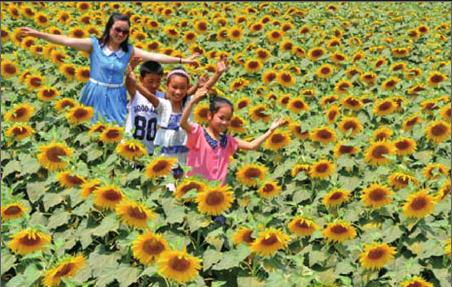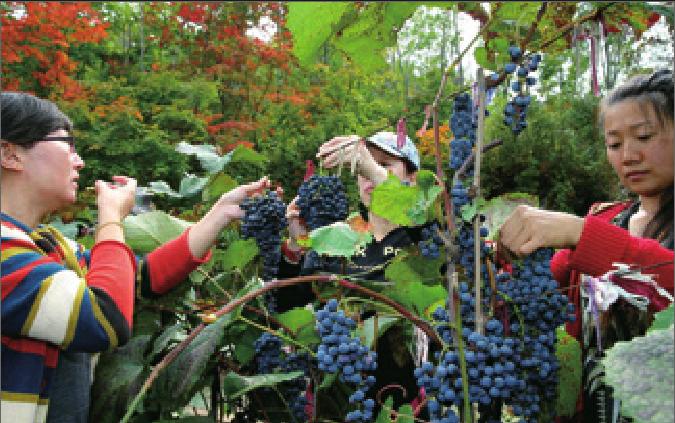Bright Spot
2015-12-01ByTangYuankai
By+Tang+Yuankai


In the peak autumn travel season, while nearly 2.8 million tourists from other parts of China swarmed places of historical interest in Beijing during the week-long National Day holiday (October 1-7), many Beijingers chose to stay away from the crowd and spend a refreshing holiday in tranquil rural areas. In addition to relishing idyllic scenery, their time in the countryside is typically filled with activities such as picking fruits, helping with farm work and tasting local delicacies.
In the past 20 years, agriculturally based tourism activities, commonly known as agrotourism, have flourished in China, and are increasingly attracting urban dwellers from all over the country.
The Chinese Government made the decision in October 2005 to promote agro-tourism across the country, especially in rural areas adjacent to cities. As a new agricultural development model, agro-tourism was written into the countrys 11th Five-Year Plan (2006-10) for national economic and social development.
The growth of agro-tourism has subsequently surged in recent years. Statistics from the Ministry of Agriculture show that as of the end of 2014, agro-tourist destinations had received about 1 billion visitors, who brought in a total income of 300 billion yuan ($47.19 billion), benefiting about 30 million farmers.
From October 1 to 7, Binzhou in Shandong Province, a city with a population of 3.8 million, received more than 2 million tourists. Data from the citys tourism bureau shows that more than 70 percent of these tourists went to rural areas.
“Every year, Chinese people pay 3.6 billion visits to domestic tourist destinations, and half of the visits are paid to the countryside. At least 600 million visits are hosted directly by farmers,”said Du Yili, Deputy Director of China National Tourism Administration.
Official statistics reveal that the first half of this year saw 301.8 billion yuan ($47.47 billion) of tourism investment, representing a year-onyear increase of 28 percent, which was higher than the overall growth rate of investment in the tertiary industry. Rural tourism products are often coveted by investors.
On August 11, the State Council released a set of guidelines on boosting tourism develop- ment. The document paints a bright prospect for the agro-tourism industry. It said that as of 2020, Chinas rural areas are expected to receive more than 2 billion visits each year, which will benefit about 50 million farmers.
Booming industry
Last year, Beijings agro-tourism businesses received more than 38 million visitors, producing an annual income near 3.62 billion yuan ($569 million), according to the Beijing Municipal Commission of Rural Affairs.
Now 80,000 people in Beijing are directly employed in the industry, said Feng Leping, head of the Beijing Federation of FarmersCooperatives.
Nanjing, capital of Jiangsu Province, is also striving to become a major destination in the country for agro-tourism trips. The citys Jiangning District held an agricultural carnival in mid-October to attract urbanites to the rural area. The city promoted the event through radio, TV, newspapers, websites and social networking app WeChat.
The number of tourists participating in agro-tourism programs has steadily grown at an average annual rate of 20 percent, according to Ge Lei, a division manager at CYTS-LINKAGE Public Relations Consulting Co. Ltd. Additionally, he noted that tourists usually make excursions suburban areas mostly during the weekends.
The huge market potential of agro-tourism has aroused the interest of farmers, local governments and private investors alike. In many regions, previously dispersed businesses have become more concentrated to attract a greater amount of people, said Chen Jianping, President of the Zhejiang Provincial Academy of Agricultural Sciences.
This has been the case in Chinas southernmost province of Hainan, a popular tropical tourism destination. In July 2009, the province was the first in China to set up an agro-tourism development bureau. It has since launched a number of initiatives to spur the industrys development. Currently, the province has about 200 related businesses and organizations, which employ approximately 17,200 people.
In Hainans countryside, Li Fangfang, a recent tourist from Beijing, was excited to see many tropical crops that she had never seen before. During her trip, she also learned how coffee beans are planted and processed.“Hainans rural scene is very good, and the air is fresh,” she commented.
Supportive policies
In essence, agro-tourism provides an important new source of income for farmers, said Yang Shaopin, chief economist of the Ministry of Agriculture. He said that in a mountain area, he recently met a couple who run an agro-tainment inn with only four beds and was told the owners could make more money from the small business than doing physical work in a city.
In terms of promoting the industry, the State Council document released on August 11 said that such local businesses should be encouraged, relevant facilities should be improved, distinct features of rural tourism destinations should be maintained and ancient villages and towns should be protected.
Recently, the Ministry of Agriculture, together with 11 fellow governmental departments, issued a notice on promoting the industry, highlighting the importance of expanding its market size and diversifying agro-tourism products. It also pointed out that the development of agro-tourism should be integrated with the initiatives to promote agricultural and rural modernization, ecological progress, employment and development of cultural products, and that efforts should be made to accelerate the integrated growth of primary, secondary and tertiary industries.
Chen Liang, an official with the Agriculture Department of Hainan, explained that agriculture belongs to the primary industry, agricultural product processing is a secondary industry, and tourism is a tertiary industry, so agro-tourism integrates all three.
Additionally, the government notice stated that idle homesteads and unclaimed land can be used to develop the industry. It requires local governments to offer preferential tax treatment and banks to grant loans to eligible farmers, and encourages qualified agro-tourism businesses to get listed on the stock market.
At the same time, the notice said the government should strengthen monitoring and analysis of the industry, establish a sound statistical system and support the building of public transit systems in tourist destinations.
Digitalized services
While visiting mountain villages in Beijings periphery recently, many tourists were surprised to find they had access to free Wi-Fi.
Wang Wei, an official in Heishansi Village of Miyun County in northern suburban Beijing, said that in previous years, many visitors went to the mountainous village but they rarely spent the night. “Tourists complained that due to poor Internet connectivity on the mountain, they could not even share their dining pictures on their WeChat accounts,” Wang said.
Last year, the village raised funds from various sources to offer free Wi-Fi access to the whole village. “Apparently more visitors choose to stay overnight now, and the investment is worthwhile,” Wang remarked.
The county supports villages in the tourism industry to set up Wi-Fi, according to the Miyun County Tourism Development Commission.
Now many villages in suburban Beijing offer free Internet access. As a result, tourists can easily find routes to nearby destinations and pay for specialty agricultural products using their cellphones.
During the first Beijing Farm Festival that lasted from July 18 to the end of this year, both online and offline activities are held, and relevant resources are presented online. “The innovative online-to-offline model will inject new vitality to agro-tourism,” said Shi Hongfang, President of the Beijing Sightseeing and Agrotourism Association.
According to China News Agency, more than 900 agro-tourism parks in Beijing currently have microblog accounts, and more than 300 associated business entities have opened WeChat accounts.
The public notice jointly issued by the Ministry of Agriculture and other government departments stressed that online and offline marketing capability should continue to be improved and online booking and payment platforms should be constructed, so as to promote the industrys digitalization in the Internet age.
